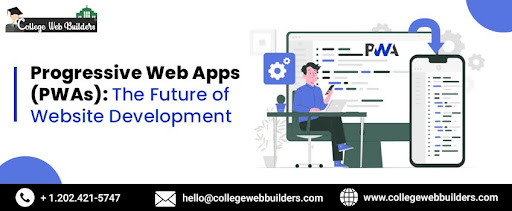
Progressive Web Apps (PWAs): The Future of Website Development
In today's fast-paced digital world, websites are no longer confined to being static pages on the internet. They have evolved into dynamic platforms that provide immersive user experiences across various devices. One of the hottest trends in website development is Progressive Web Apps (PWAs). PWAs combine the best of web and mobile app technologies, offering users an app-like experience directly through their browsers. In this blog, our website development agency in the USA will explore the concept of PWAs and why they are considered the future of website development.
Understanding Progressive Web Apps
Progressive Web Apps (PWAs) are a modern approach to web development that combines the best features of web and mobile applications. They are designed to provide users with an app-like experience directly within a web browser, eliminating the need to download and install traditional mobile apps from app stores. Here's a brief overview of Progressive Web Apps:
1) Offline Functionality: One of the key features of PWAs is their ability to work offline or with limited connectivity. They use caching techniques to store essential assets, allowing users to access content and perform certain actions even when they are offline.
2) Responsive Design: PWAs are built with responsive design principles, ensuring that they adapt and provide a seamless experience across different devices and screen sizes. They are designed to be mobile-friendly, delivering a consistent experience on smartphones, tablets, and desktops.
3) App-Like User Experience: PWAs provide an app-like experience with features such as push notifications, home screen icons, and fullscreen mode. Users can add PWAs to their device's home screen, allowing quick and easy access without navigating through a web browser.
4) Cross-Platform Compatibility: PWAs are platform-agnostic, which means they work across multiple operating systems and devices. They can run on different browsers, including Chrome, Firefox, Safari, and Edge, making them accessible to a broader audience.
5) Faster Performance: PWAs are designed to be lightweight and load quickly, providing a fast and smooth user experience. They leverage technologies like service workers and optimized caching strategies to improve performance and reduce page load times.
6) Discoverability and SEO: PWAs are discoverable by search engines, which means they can be indexed and appear in search results. This helps with the visibility and reach of the PWA, driving organic traffic and improving search engine optimization (SEO) efforts.
7) Cost-Effective Development: Compared to developing separate native apps for different platforms, PWAs offer a cost-effective solution. With a single codebase, businesses can reach multiple platforms, reducing development time and costs.
8) Easy Updates: With PWAs, updates are seamless and automatic. Users always have access to the latest version of the app without the need for manual updates or app store approvals.
Progressive Web Apps have gained popularity due to their ability to deliver a mobile app-like experience without the need for native app development. They offer numerous benefits for businesses, including improved user experience, broader reach, increased engagement, and cost-effective development. As technology continues to evolve, PWAs are expected to play an even more significant role in the future of web development.
Key Features and Benefits of PWAs
1) Offline Functionality: One of the significant advantages of PWAs is their ability to work offline. PWAs use service workers, which are scripts running in the background, to cache and store data. This allows users to access content even when they are offline or have a weak internet connection.
2) Responsive and Cross-platform Compatibility: PWAs are designed to be responsive, adapting to different screen sizes and orientations. They work seamlessly across various platforms and devices, including desktops, tablets, and smartphones. This cross-platform compatibility simplifies the development process and ensures a consistent user experience.
3) App-like Experience: PWAs provide a smooth and immersive user experience similar to native mobile apps. They can be launched from the home screen, utilize push notifications, and have access to device features such as cameras and geolocation. This enhances user engagement and encourages frequent usage.
4) Improved Performance: PWAs are known for their fast loading speeds and smooth navigation. They leverage techniques like caching, lazy loading, and efficient resource management to deliver a snappy and responsive user experience. As a result, users are less likely to abandon the app due to slow loading times.
5) Enhanced Discoverability: PWAs are discoverable by search engines, making them more accessible to users. They can be indexed and appear in search engine results, increasing their visibility and attracting a wider audience. This makes PWAs a powerful tool for businesses looking to expand their online presence.
6) Cost-effective Development and Maintenance: Building a PWA involves using web technologies that are familiar to many developers, reducing the need for specialized knowledge. Additionally, maintaining a single codebase for multiple platforms simplifies updates and bug fixes, resulting in cost savings for businesses.
7) Increased Conversion and Engagement: The immersive and seamless user experience offered by PWAs leads to higher user engagement and increased conversions. Studies have shown that PWAs can improve user retention, increase time spent on site, and boost conversion rates, ultimately driving business growth.
Scope of Progressive Web Apps
The scope of Progressive Web Apps (PWAs) is expanding rapidly as businesses and developers recognize their potential to provide a seamless and engaging user experience across various platforms and devices. Hence, our website development company has taken a closer look at the scope of PWAs:
1) Cross-platform Compatibility: PWAs are designed to work across different platforms and devices, including desktops, smartphones, tablets, and even smart TVs. They are built using standard web technologies such as HTML, CSS, and JavaScript, making them platform-agnostic. This cross-platform compatibility allows businesses to reach a broader audience and ensures a consistent experience for users regardless of the device they are using.
2) Offline Functionality: One of the key features of PWAs is their ability to work offline or with limited connectivity. By leveraging caching techniques and storing essential assets, PWAs can still provide core functionality even when users are offline. This offline capability is especially beneficial in regions with unreliable internet connections or for users who frequently travel or find themselves in areas with limited network coverage.
3) App-Like Experience: PWAs provide an app-like experience directly within a web browser. They can be added to the home screen of a device and accessed with a single tap, just like a native app. PWAs can also leverage features such as push notifications, background syncing, and fullscreen mode, enhancing the user experience and bridging the gap between web and native apps.
4) Improved Performance: PWAs are optimized for performance, delivering fast and responsive experiences. They leverage modern web technologies and techniques like service workers, which enable caching, preloading, and background data syncing. These optimizations result in faster loading times, smooth interactions, and reduced data consumption, improving user satisfaction and engagement.
5) Discoverability and SEO: PWAs are discoverable by search engines, making them searchable and indexable. This means that businesses can benefit from organic search traffic and improve their search engine visibility. PWAs can also be shared via URLs, allowing users to easily share specific pages or content with others, increasing the potential for organic reach and referral traffic.
6) Cost-Effective Development: Developing and maintaining separate native apps for different platforms can be costly and time-consuming. PWAs offer a cost-effective alternative as they use a single codebase that can be deployed across multiple platforms. This streamlines the development process, reduces costs, and simplifies ongoing maintenance and updates.
Conclusion
As the digital landscape continues to evolve, Progressive Web Apps (PWAs) have emerged as a game-changer in website development. With their ability to deliver app-like experiences, offline functionality, and improved performance, PWAs are revolutionizing the way users interact with websites. The numerous benefits of PWAs, including cross-platform compatibility, enhanced discoverability, and cost-effective development, make them a compelling choice for businesses aiming to provide a seamless and engaging user experience. Embracing PWAs can undoubtedly future-proof websites and pave the way for innovative and interactive online experiences. For more information or to avail of our website development services in Ashburn USA, visit Collegewebbuilders.com.
- Tags: Marketing, Onlline, Internet





